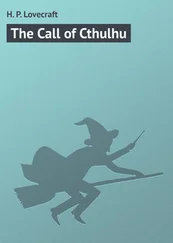Howard Lovecraft - The Call of Cthulhu
Здесь есть возможность читать онлайн «Howard Lovecraft - The Call of Cthulhu» весь текст электронной книги совершенно бесплатно (целиком полную версию без сокращений). В некоторых случаях можно слушать аудио, скачать через торрент в формате fb2 и присутствует краткое содержание. Жанр: Ужасы и Мистика, на английском языке. Описание произведения, (предисловие) а так же отзывы посетителей доступны на портале библиотеки ЛибКат.
- Название:The Call of Cthulhu
- Автор:
- Жанр:
- Год:неизвестен
- ISBN:нет данных
- Рейтинг книги:3 / 5. Голосов: 1
-
Избранное:Добавить в избранное
- Отзывы:
-
Ваша оценка:
- 60
- 1
- 2
- 3
- 4
- 5
The Call of Cthulhu: краткое содержание, описание и аннотация
Предлагаем к чтению аннотацию, описание, краткое содержание или предисловие (зависит от того, что написал сам автор книги «The Call of Cthulhu»). Если вы не нашли необходимую информацию о книге — напишите в комментариях, мы постараемся отыскать её.
The Call of Cthulhu — читать онлайн бесплатно полную книгу (весь текст) целиком
Ниже представлен текст книги, разбитый по страницам. Система сохранения места последней прочитанной страницы, позволяет с удобством читать онлайн бесплатно книгу «The Call of Cthulhu», без необходимости каждый раз заново искать на чём Вы остановились. Поставьте закладку, и сможете в любой момент перейти на страницу, на которой закончили чтение.
Интервал:
Закладка:
"Ph'nglui mglw'nafh Cthulhu R'lyeh wgah'nagl fhtagn."
Legrasse had one point in advance of Professor Webb, for several among his mongrel prisoners had repeated to him what older celebrants had told them the words meant. This text, as given, ran something like this:
"In his house at R'lyeh dead Cthulhu waits dreaming."
And now, in response to a general and urgent demand, Inspector Legrasse related as fully as possible his experience with the swamp worshippers; telling a story to which I could see my uncle attached profound significance. It savoured of the wildest dreams of myth-maker and theosophist, and disclosed an astonishing degree of cosmic imagination among such half-castes and pariahs as might be least expected to possess it.
On November 1st, 1907, there had come to the New Orleans police a frantic summons from the swamp and lagoon country to the south. The squatters there, mostly primitive but good-natured descendants of Lafitte's men, were in the grip of stark terror from an unknown thing which had stolen upon them in the night. It was voodoo, apparently, but voodoo of a more terrible sort than they had ever known; and some of their women and children had disappeared since the malevolent tom-tom had begun its incessant beating far within the black haunted woods where no dweller ventured. There were insane shouts and harrowing screams, soul-chilling chants and dancing devil-flames; and, the frightened messenger added, the people could stand it no more.
So a body of twenty police, filling two carriages and an automobile, had set out in the late afternoon with the shivering squatter as a guide. At the end of the passable road they alighted, and for miles splashed on in silence through the terrible cypress woods where day never came. Ugly roots and malignant hanging nooses of Spanish moss beset them, and now and then a pile of dank stones or fragment of a rotting wall intensified by its hint of morbid habitation a depression which every malformed tree and every fungous islet combined to create. At length the squatter settlement, a miserable huddle of huts, hove in sight; and hysterical dwellers ran out to cluster around the group of bobbing lanterns. The muffled beat of tom-toms was now faintly audible far, far ahead; and a curdling shriek came at infrequent intervals when the wind shifted. A reddish glare, too, seemed to filter through pale undergrowth beyond the endless avenues of forest night. Reluctant even to be left alone again, each one of the cowed squatters refused point-blank to advance another inch toward the scene of unholy worship, so Inspector Legrasse and his nineteen colleagues plunged on unguided into black arcades of horror that none of them had ever trod before.
The region now entered by the police was one of traditionally evil repute, substantially unknown and untraversed by white men. There were legends of a hidden lake unglimpsed by mortal sight, in which dwelt a huge, formless white polypous thing with luminous eyes; and squatters whispered that bat-winged devils flew up out of caverns in inner earth to worship it at midnight. They said it had been there before d'Iberville, before La Salle, before the Indians, and before even the wholesome beasts and birds of the woods. It was nightmare itself, and to see it was to die. But it made men dream, and so they knew enough to keep away. The present voodoo orgy was, indeed, on the merest fringe of this abhorred area, but that location was bad enough; hence perhaps the very place of the worship had terrified the squatters more than the shocking sounds and incidents.
Only poetry or madness could do justice to the noises heard by Legrasse's men as they ploughed on through the black morass toward the red glare and muffled tom-toms. There are vocal qualities peculiar to men, and vocal qualities peculiar to beasts; and it is terrible to hear the one when the source should yield the other. Animal fury and orgiastic license here whipped themselves to daemoniac heights by howls and squawking ecstacies that tore and reverberated through those nighted woods like pestilential tempests from the gulfs of hell. Now and then the less organized ululation would cease, and from what seemed a well-drilled chorus of hoarse voices would rise in sing-song chant that hideous phrase or ritual:
"Ph'nglui mglw'nafh Cthulhu R'lyeh wgah'nagl fhtagn."
Then the men, having reached a spot where the trees were thinner, came suddenly in sight of the spectacle itself. Four of them reeled, one fainted, and two were shaken into a frantic cry which the mad cacophony of the orgy fortunately deadened. Legrasse dashed swamp water on the face of the fainting man, and all stood trembling and nearly hypnotised with horror.
In a natural glade of the swamp stood a grassy island of perhaps an acre's extent, clear of trees and tolerably dry. On this now leaped and twisted a more indescribable horde of human abnormality than any but a Sime or an Angarola could paint. Void of clothing, this hybrid spawn were braying, bellowing, and writhing about a monstrous ring-shaped bonfire; in the centre of which, revealed by occasional rifts in the curtain of flame, stood a great granite monolith some eight feet in height; on top of which, incongruous in its diminutiveness, rested the noxious carven statuette. From a wide circle of ten scaffolds set up at regular intervals with the flame-girt monolith as a centre hung, head downward, the oddly marred bodies of the helpless squatters who had disappeared. It was inside this circle that the ring of worshippers jumped and roared, the general direction of the mass motion being from left to right in endless Bacchanal between the ring of bodies and the ring of fire.
It may have been only imagination and it may have been only echoes which induced one of the men, an excitable Spaniard, to fancy he heard antiphonal responses to the ritual from some far and unillumined spot deeper within the wood of ancient legendry and horror. This man, Joseph D. Galvez, I later met and questioned; and he proved distractingly imaginative. He indeed went so far as to hint of the faint beating of great wings, and of a glimpse of shining eyes and a mountainous white bulk beyond the remotest trees but I suppose he had been hearing too much native superstition.
Actually, the horrified pause of the men was of comparatively brief duration. Duty came first; and although there must have been nearly a hundred mongrel celebrants in the throng, the police relied on their firearms and plunged determinedly into the nauseous rout. For five minutes the resultant din and chaos were beyond description. Wild blows were struck, shots were fired, and escapes were made; but in the end Legrasse was able to count some forty-seven sullen prisoners, whom he forced to dress in haste and fall into line between two rows of policemen. Five of the worshippers lay dead, and two severely wounded ones were carried away on improvised stretchers by their fellow-prisoners. The image on the monolith, of course, was carefully removed and carried back by Legrasse.
Examined at headquarters after a trip of intense strain and weariness, the prisoners all proved to be men of a very low, mixed-blooded, and mentally aberrant type. Most were seamen, and a sprinkling of Negroes and mulattoes, largely West Indians or Brava Portuguese from the Cape Verde Islands, gave a colouring of voodooism to the heterogeneous cult. But before many questions were asked, it became manifest that something far deeper and older than Negro fetishism was involved. Degraded and ignorant as they were, the creatures held with surprising consistency to the central idea of their loathsome faith.
They worshipped, so they said, the Great Old Ones who lived ages before there were any men, and who came to the young world out of the sky. Those Old Ones were gone now, inside the earth and under the sea; but their dead bodies had told their secrets in dreams to the first men, who formed a cult which had never died. This was that cult, and the prisoners said it had always existed and always would exist, hidden in distant wastes and dark places all over the world until the time when the great priest Cthulhu, from his dark house in the mighty city of R'lyeh under the waters, should rise and bring the earth again beneath his sway. Some day he would call, when the stars were ready, and the secret cult would always be waiting to liberate him.
Читать дальшеИнтервал:
Закладка:
Похожие книги на «The Call of Cthulhu»
Представляем Вашему вниманию похожие книги на «The Call of Cthulhu» списком для выбора. Мы отобрали схожую по названию и смыслу литературу в надежде предоставить читателям больше вариантов отыскать новые, интересные, ещё непрочитанные произведения.
Обсуждение, отзывы о книге «The Call of Cthulhu» и просто собственные мнения читателей. Оставьте ваши комментарии, напишите, что Вы думаете о произведении, его смысле или главных героях. Укажите что конкретно понравилось, а что нет, и почему Вы так считаете.





